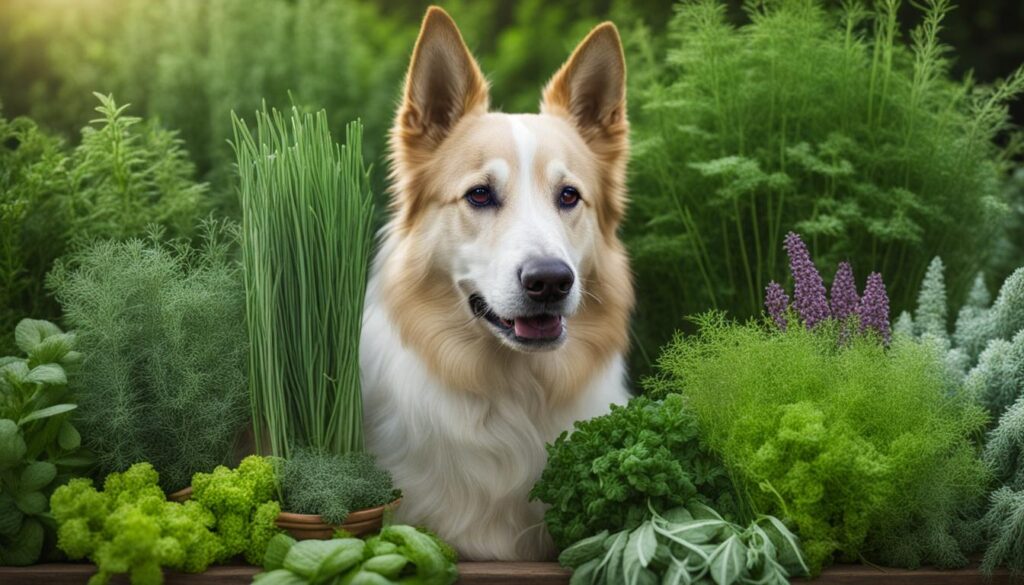Herbs Safe for Dogs: Discover the Best Options
If you’re looking for natural remedies to support your dog’s health, incorporating herbs into their diet can be a great option. Many herbs and spices that are safe for humans can also benefit dogs in various ways. Herbs can provide antioxidants, aid in digestion, reduce inflammation, and even act as natural flea repellants.
Before you start adding herbs to your dog’s meals, it’s important to know which ones are safe and beneficial for them. In this article, we will explore some of the best herbs for dogs, their health benefits, and how to introduce them into your furry friend’s diet.
Key Takeaways:
- Many herbs that are safe for humans can also benefit dogs.
- Oregano, rosemary, peppermint, parsley, basil, cinnamon, coriander, and ginger are some of the herbs that can have positive effects on dogs.
- It’s essential to introduce herbs slowly and in small doses to prevent any adverse reactions.
- Consulting with a vet is recommended, especially if your dog has any underlying medical conditions.
- Incorporating herbs into your dog’s diet can provide numerous health benefits, but always prioritize their safety and well-being.
The Health Benefits of Basil, Chamomile, and Dandelion for Dogs
When it comes to promoting canine health, harnessing the power of herbs can be a natural and beneficial approach. Basil, chamomile, and dandelion are three herbs that offer unique health benefits for dogs. Incorporating these herbs into your furry friend’s diet can support their overall well-being and help address common ailments. Let’s explore how these herbs can benefit your dog’s health.
Basil: A Boost for Cardiovascular Health and Tumor Prevention
Basil is not only a flavorful herb but also a rich source of essential vitamins and minerals. It contains powerful antioxidants that combat free radicals and help protect cells from damage. In addition to its antioxidant properties, basil can support cardiovascular health by promoting healthy blood circulation and warding off heart diseases. This herb is also believed to hinder tumor formation, making it a valuable addition to your dog’s diet.
Chamomile: A Soothing Aid for Gastrointestinal Issues and Skin Irritations
Chamomile is well-known for its calming effects, both in humans and dogs. For dogs experiencing gastrointestinal issues like indigestion or upset stomachs, chamomile can alleviate discomfort and support healthy digestion. It possesses anti-inflammatory properties that can help soothe skin irritations and promote healing. Chamomile can be particularly beneficial for dogs with sensitive skin or allergies, providing gentle relief.
Dandelion: A Nutrient-Packed Support for Liver Function and Overall Health
Often dismissed as a pesky weed, dandelion is actually a highly nutritious herb that offers numerous health benefits for dogs. Dandelion supports liver function, aiding in detoxification and improving bile flow. It is also rich in essential vitamins and minerals, promoting strong tooth enamel and bone health. Additionally, dandelion can soothe insect bites, improve digestion, and act as a blood tonic, supporting your dog’s overall well-being.

Adding basil, chamomile, and dandelion to your dog’s diet can provide a range of health benefits, from cardiovascular support to skin irritation relief. However, it’s essential to introduce these herbs gradually and consult with your veterinarian before making any changes to your dog’s diet, especially if they have underlying health conditions. As with any natural remedy, it’s important to ensure that the herbs are safe for your furry friend and do not interact with any medications they may be taking. By incorporating these herbs into your dog’s routine, you can help promote their overall health and well-being.
Dill, Horsetail, and Mint: Herbs for Digestive Health and Coat Care
When it comes to promoting your dog’s digestive health and maintaining a lustrous coat, nature provides a variety of herbal options. Dill, horsetail, and mint are three dog-friendly herbs that offer numerous benefits for your furry friend. Let’s explore how these herbs can help support your dog’s well-being.
Dill: Aid Digestion and Soothe the Digestive Tract
Dill is not just a popular ingredient in your favorite recipes; it can also be a valuable addition to your dog’s diet. This herb is known for its ability to aid digestion, fight infections, and soothe the digestive tract. It possesses antimicrobial properties that can help prevent the growth of harmful bacteria in your dog’s gut, promoting a healthy digestive system. Additionally, dill can ease gastrointestinal discomfort and alleviate symptoms of indigestion.
Horsetail: Rich in Silicon for Various Health Benefits
Horsetail is a natural herb that contains high levels of silicon, which plays a crucial role in maintaining healthy bones, teeth, and connective tissues. Incorporating horsetail into your dog’s diet can help support bladder and kidney health, alleviate arthritis symptoms, and address certain skin disorders. It’s worth noting that horsetail should be used with caution and under the guidance of a veterinarian due to its potent effects.
Mint: Improve Digestion and Act as a Homemade Flea Spray
Mint, particularly peppermint and spearmint, offers a range of benefits for your dog’s well-being. It can aid digestion by promoting the secretion of digestive enzymes, soothing the gastrointestinal system, and alleviating gastric discomfort. In addition, mint can serve as a powerful natural flea repellent when used as a homemade spray. The refreshing scent of mint can help ward off fleas and keep your dog feeling fresh.
These herbal alternatives for dog medications can provide effective solutions for digestive health and coat care. By incorporating dill, horsetail, and mint into your dog’s routine, you can support their overall well-being and promote a happier, healthier life.
| Herb | Benefits |
|---|---|
| Dill | Aids digestion, fights infections, soothes the digestive tract |
| Horsetail | Rich in silicon, supports bladder and kidney health, addresses arthritis and skin disorders |
| Mint | Improves digestion, soothes the gastrointestinal system, acts as a homemade flea spray |
Now that you know the benefits of dill, horsetail, and mint, you can consider incorporating these herbal remedies into your dog’s diet. Remember to consult with your veterinarian before introducing any new herbs or supplements, especially if your dog has underlying health conditions. By harnessing the power of nature, you can provide your furry companion with the best care.

Oregano, Parsley, and Sage: Versatile Herbs with Multiple Benefits
When it comes to supporting your dog’s health and well-being, incorporating herbal remedies into their routine can be incredibly beneficial. In this section, we’ll explore the versatile properties of three herbs: oregano, parsley, and sage. These herbs offer multiple benefits ranging from antioxidant and anti-inflammatory properties to supporting the immune system and soothing allergies.
Oregano: Stress relief and immune support
Oregano is not only a flavorful addition to your cooking, but it also boasts impressive health benefits for your furry friend. Packed with antioxidants, oregano can help neutralize harmful free radicals and reduce oxidative stress in your dog’s body. Additionally, it contains anti-inflammatory properties that can inhibit inflammation and reduce muscle pain.
If your dog experiences anxiety or stress, oregano can also be used as an effective herbal remedy. Its soothing effects can help calm an anxious dog and promote a sense of relaxation. To introduce oregano to your dog’s routine, you can sprinkle a small amount of dried oregano onto their food or consult with your vet about the appropriate dosage.
Parsley: Nutrient-rich and tumor inhibiting
Parsley is more than just a garnish; it’s a powerhouse of vitamins and minerals that can bolster your dog’s health in various ways. This herb is rich in vitamin K, vitamin C, iron, and potassium, among other essential nutrients. These nutrients contribute to overall well-being and support the proper functioning of your dog’s immune system.
Moreover, parsley contains unique compounds that inhibit tumor formation and neutralize carcinogens. By incorporating parsley into your dog’s diet, you can provide them with valuable protection against the development of certain cancers. Whether you use fresh or dried parsley, be sure to introduce it gradually and in controlled amounts based on your dog’s weight and size.
Sage: Gastrointestinal support and allergy relief
If your dog struggles with digestive issues or seasonal allergies, sage can be a herb worth considering. This aromatic herb not only adds flavor to your dishes but also provides relief for your furry companion. Sage has properties that soothe the gastrointestinal tract, making it beneficial for dogs with digestive discomfort or an upset stomach.
Furthermore, sage can be particularly helpful for dogs with seasonal allergies. It supports the immune system and reduces inflammation, which can help alleviate symptoms such as itchiness, redness, and irritation. Introducing sage to your dog’s routine can be as simple as infusing it into their meals or incorporating it into homemade treats.
By incorporating oregano, parsley, and sage into your dog’s diet, you can take advantage of their versatile properties and multiple benefits. However, always remember to introduce herbs gradually and consult with your vet to ensure the safety and appropriateness for your dog’s specific needs.
| Herb | Benefits |
|---|---|
| Oregano | – Rich in antioxidants – Anti-inflammatory properties – Stress relief – Immune support |
| Parsley | – Nutrient-rich – Tumor inhibiting – Supports the immune system |
| Sage | – Gastrointestinal support – Allergy relief – Supports the immune system |

Thyme, Turmeric, and Cautions About Toxic Herbs
In this section, we will explore the benefits of thyme and turmeric for dogs, as well as provide important cautions about toxic herbs to avoid. Thyme is a powerful antioxidant that inhibits the growth of bacteria and fungus, making it a valuable addition to your dog’s diet. Its antimicrobial properties can help improve overall health and well-being. Meanwhile, turmeric is well-known for its anti-inflammatory and antioxidant properties. It can support your dog’s joint health, improve bile production and flow, and even aid in treating minor cuts and wounds.
While many herbs provide numerous benefits for dogs, it’s essential to be aware of toxic herbs that can be harmful or even toxic to our furry friends. To ensure your dog’s safety, avoid feeding them herbs such as garlic, cocoa powder, nutmeg, onions, chives, salt, paprika, pepper, mace, tea tree oil, yuca, and hops. These herbs can potentially cause serious health issues and should be strictly avoided.
| Herb | Benefits | Cautions |
|---|---|---|
| Thyme | Powerful antioxidant Inhibits bacteria and fungus growth |
None |
| Turmeric | Anti-inflammatory and antioxidant properties Improves bile production and flow Can treat minor cuts and wounds |
None |
| Garlic | None | Can be toxic to dogs |
| Cocoa Powder | None | Can be toxic to dogs |
| Nutmeg | None | Can be toxic to dogs |
| Onions | None | Can be toxic to dogs |
| Chives | None | Can be toxic to dogs |
| Salt | None | Can be toxic to dogs |
| Paprika | None | Can be toxic to dogs |
| Pepper | None | Can be toxic to dogs |
| Mace | None | Can be toxic to dogs |
| Tea Tree Oil | None | Can be toxic to dogs |
| Yuca | None | Can be toxic to dogs |
| Hops | None | Can be toxic to dogs |
Tips for Introducing Herbs to Your Dog’s Diet
When it comes to improving your dog’s health, incorporating herbs into their diet can provide numerous benefits. However, it’s important to introduce herbs gradually and in small doses to prevent any potential side effects. Here are some helpful tips to ensure a smooth transition:
- Consult with your vet: Before adding any herbs to your dog’s diet, it’s essential to consult with your veterinarian, especially if your dog has any pre-existing medical conditions or health issues. Your vet can provide guidance and recommend specific herbs that are safe for your dog.
- Start slow: Begin by introducing one herb at a time and monitor your dog’s response. Start with a small amount and gradually increase the dosage as your dog adjusts to the new addition. This allows their digestive system to adapt and reduces the risk of any adverse reactions.
- Choose dog-friendly herbs: Not all herbs are safe for dogs. Stick to herbs that are known to be safe and beneficial for canine health. Some popular options include oregano, parsley, basil, chamomile, and ginger.
- Mix with food: To make it easier for your dog to consume herbs, you can sprinkle them on top of their regular food. This adds flavor and nutrients to their meals. Alternatively, you can mix herbs with a small amount of plain yogurt or broth for a tasty treat.
- Observe your dog’s response: As you introduce herbs to your dog’s diet, closely monitor their behavior, digestion, and overall well-being. Keep an eye out for any changes, both positive and negative, and adjust the dosage accordingly.
Remember, each dog is unique, and what works for one may not work for another. It’s always best to consult with your vet to ensure you’re providing the right herbs and dosages for your dog’s specific needs.
The Benefits of Incorporating Herbs into Your Dog’s Diet
Add table here.
Conclusion
Incorporating herbs into your dog’s diet can provide numerous health benefits for their overall well-being. From improved digestion to reduced inflammation, natural remedies can support your dog’s health in a holistic way. However, it is crucial to choose the right herbs and introduce them slowly and in moderation to ensure your dog’s safety and wellbeing.
When considering herbs for canine health, it’s important to do your research and consult with your veterinarian. While many herbs offer valuable health benefits, some can be toxic to dogs. Educating yourself about potential risks and knowing which herbs are safe for dogs is essential.
Remember, natural remedies such as herbal supplements for dogs should never replace professional veterinary care. Always consult with your vet before adding any herbs or supplements to your dog’s diet, especially if your dog has existing medical conditions or is taking other medications.
By incorporating herbs for canine health into your dog’s diet under the guidance of a veterinarian, you can provide them with natural support for their overall health and wellness. Ensure that you choose high-quality herbal supplements for dogs and introduce them gradually, observing any changes in your dog’s behavior or health. With proper care and precaution, herbal remedies can be a valuable addition to your dog’s wellness routine.
FAQ
What herbs are safe for dogs?
Many herbs that are safe for humans can also benefit dogs. Some safe herbs for dogs include oregano, rosemary, peppermint, parsley, basil, cinnamon, coriander, ginger, basil, chamomile, dandelion, dill, horsetail, mint, sage, thyme, and turmeric.
What are the benefits of herbs for dogs?
Herbs can provide numerous health benefits for dogs. They can support canine health, aid in digestion, reduce inflammation, soothe skin irritations, act as natural flea repellants, support liver function, improve bone health, and boost the immune system.
What are some herbal remedies for common dog ailments?
Some herbal remedies for common dog ailments include using oregano and parsley for digestive issues, chamomile for gastrointestinal problems and skin irritations, dandelion for liver support, mint for improved digestion and homemade flea spray, and turmeric for its anti-inflammatory properties.
What are some herbal alternatives for dog medications?
There are many herbal alternatives for dog medications. Some examples include using basil and chamomile for anxiety, dill and mint for digestive health, and sage for dogs with seasonal allergies.
Are there any cautions about using herbs for dogs?
While many herbs are safe for dogs, there are some toxic herbs that should be avoided, such as garlic, cocoa powder, nutmeg, onions, chives, salt, paprika, pepper, mace, tea tree oil, yuca, and hops. It’s important to educate yourself about potential risks before introducing herbs to your dog’s diet.
How do I introduce herbs to my dog’s diet?
It’s important to introduce herbs slowly and in small doses to your dog’s diet. Some herbs can have side effects if ingested in large quantities. If your dog has any medical conditions or health issues, it’s advised to consult with your vet before adding anything new to their diet.
Can I sprinkle herbs on my dog’s food?
Yes, herbs can be sprinkled on top of your dog’s raw food for added flavor and health benefits. Just make sure to choose herbs that are safe for dogs and introduce them gradually and in moderation.


